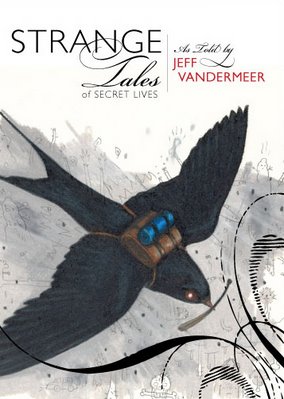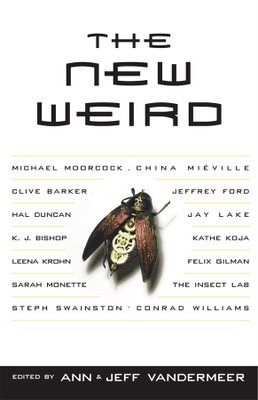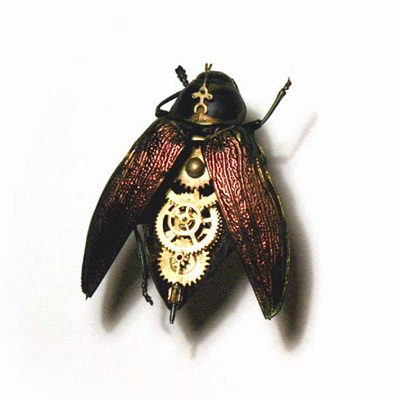FINCH (excerpt)
I: What did you see then? After they took the sack off your head?
F: Nothing. I couldn’t see anything.
I: Wrong answer.
F: [howls and screams and sobbing]
I: What did you see, Finch?
F: Just the stars. Stars. I was lying on a hill in the grass. At night.
I: I can ask you this same question for hours, Finch. I can ask you and then they can have the skery ask again in the morning. Except the skery won’t really care about your answers.
F: I saw the Lady in Blue, damn you.
I: There is no Lady in Blue. She’s just a propaganda myth from the rebels.
F: I saw her. On the hill. Under the stars.
I: What did this apparition say to you, Finch? What did this vision say?
***
Finch, at the apartment door, breathing heavy from five flights of stairs, taken fast. The message that’d brought him from the station was already dying, red spore smear on a limp circle of green fungal paper that had minutes before squirmed clammy in his hand. Now he had only the door uncanny to pass through, marked with the gray caps’ symbol. The mark smelled like the thick perfume his wife had used to cover the stench of her dying.
Nothing would pass, except him.
An act of will, crossing that divide. Always. Nausea. A sudden flash of his partner Gray, telling him he was compromised, him replying, “I don’t have an opinion on that.”
Everyone’s a collaborator. Everyone’s a rebel. The truth’s in the weight of each. Written on a wall at a crime scene. Maybe the Lady in Blue had said it, once.
The knob was cold but grainy, the left side rough with light green fungus. Just like the left side of his right hand. It always felt like a point of no return, and yet he kept returning.
I am not a detective. I am not a detective.
Inside, a tall Partial dressed all in black stood halfway down the hall, staring into a doorway. Beyond him, a dark room. A worn bed. White sheets dull in the shadow. Didn’t look like anyone had slept in it in months. Dusty floor. His place had looked like this before he’d started seeing Sintra.
The Partial turned and saw Finch’s gaze. “Nothing in that room, Finch. It’s all in here.” He gestured through the doorway. Light shone out, caught the dark glitter of the Partial’s skin where tiny fruiting bodies had taken hold. Uncanny left eye. Of course.
“And you are?” Finch asked.
The Partial frowned. “I’m—”
Finch brushed by him without listening, got pleasure out of the push of his shoulder into the Partial’s side. The Partial smelled like sweetly rotting meat, walked in behind him, stood there.
Everything was golden, calm, unknowable for a second. Then Finch’s eyes adjusted to the light from the large window and he saw: living room, kitchen. A sofa. Two wooden chairs. A small table, an empty vase with a rose design. And two bodies lying on the pull rug next to the sofa. One human, male, one gray cap without legs.
His boss Heretic stood there, framed by the window. Wearing his familiar gray robes and gray hat. Finch had never learned the gray cap’s real name. The series of clicks and whistles sounded like “heclereticalic” so Finch called him “Heretic.”
“Hello, Finch,” Heretic said, in the moist glottal attempt at human speech used by all of its kind. “Just in time.”
“Just in time, sir?” Finch looked to the side, away from the liquid eyes with the green pupils and yellow where there should be white. “I came as soon as I got the message.”
“Where’s Gray?”
“Gray couldn’t come. He’s busy.”
Gray was sick, but didn’t seem to know from what. Finch knew from what, but didn’t want to.
“What’s the situation?”
Heretic smiled: rows and rows of needle lines set into a face a little like a squished-in shark’s snout. Finch couldn’t tell if the needle lines were gills or teeth, but they seemed to flutter and breathe a little. Gray said he’d seen tiny creatures in there, once.
Each time, a new nightmare. Another encounter to haunt his sleep. When he slept.
“Two dead bodies,” Heretic said.
“Two bodies?”
“One and a half, technically,” the Partial said, from behind Finch.
Heretic laughed. Finch ignored the comment.
“Do we know if the victims lived in the apartment?” Finch asked.
“No, they didn’t,” the Partial said.
Finch turned briefly to stare at the Partial, then back to Heretic.
Heretic stared at the Partial and he shut up, began to creep around the living room taking pictures with his eye.
“No one lived here,” Heretic said. “According to the photo records, no one has lived here for over a year.”
“Interesting,” Finch said. It didn’t interest him at all. All that interested him was that the Partial felt comfortable enough to answer a question meant for Heretic.
The curtains had faded from the sun. Tears in the sofa like knife wounds. The vase looked like someone had started a small fire inside it. Stage props for two deaths.
Was it significant that the window was open? For some reason he didn’t want to ask if one of them had opened it. Fresh air came in through the window. Just a hint of the marsh smell of the bay.
“Who reported this?” Finch asked.
“It was reported as an energy surge,” Heretic said. “We felt it underground. Then it was confirmed by spore camera.”
Finch tried to imagine the rows and rows of living receivers underground, miles of them if rumor held true. Trying to process trillions of images from all over the city. How could they possibly keep up? It was the hope of every citizen.
“Do you know the source?” Finch asked. He wasn’t sure he understood what Heretic was telling him.
“There is no trace of it now. The apartment is cold. There are just these bodies.”
And that helps me how?
Mostly, Finch dealt with theft, suspected rebel activity, or domestic disturbances. The usual, normal things. Otherwise, unbearable fear, as dark as it was endless.
“What do you think, Finch,” Heretic asked.
The bodies lay next to each other, beside the sofa.
Finch frowned. What do I think? I think I just walked in the door a few minutes ago. I think you, Heretic, expect too much of me.
“I don’t know yet, sir,” Finch said. “I can’t say I’ve seen anything quite like it.”
The man lay on his side, left hand stretched out toward the gray cap’s hand, while the gray cap lay face down, arms flopped out at right angles.
“Might be a foreigner. From the clothes.”
The man could’ve been forty-five or fifty, with dark brown hair, dark eyebrows, and a beard that appeared to be made from tendrils of fungus. He wore a blue shirt long out of fashion. Strange, tight-fitting long pants. Dirty black boots.
“I think he’s definitely not from the city,” Heretic said.
Finch squatted beside the bodies, took out his useless pen and his useless pad of paper. Above him, the Partial leaned over, taking pictures.
The gray cap looked like every other gray cap. Except for one detail.
“I don’t know what caused the, er, injury to the other one, sir.”
I don’t know what caused the complete lack of legs.
“When we find out,” Heretic said, “we will be just as kind as your understated description, Finch.”
The cross-section of the gray caps’ waist fascinated Finch. He almost forgot himself and poked at it with his pen.
The cut had been so clean, so precise, that there was no tearing. No hemorrhaging. Finch could see layers. Gray. Yellow. Green. A core of dark red. (Was it always that dark, or only in death? Finch didn’t want to ask.) Within the core, Finch saw a hint of organs.
“Is this…normal?” Finch asked Heretic.
Heretic laughed. It was a sound like dogs being strangled. “Normal?”
“The lack of blood, I mean, sir,” Finch said.
Gray caps bled. Finch knew that. Not like a stream or a gout, even when you cut them deep, but a steady drip from a leaky faucet. Puncture wounds healed almost immediately. It took a long time and a lot of patience to kill a gray cap.
“No, it’s not normal.” The humid weight of Heretic was at his side now. A smell like garbage and burnt glass.
Now that can’t be normal. A sudden urge to giggle.
“None of this is normal,” the Partial ventured, ignored.
Finch looked up at Heretic. From that angle, the pale wattled skin of Heretic’s long throat. Making him nauseous.
“Do you know who the…um…who…the…” Finch hesitated. Gray caps didn’t like being called “gray caps,” but Finch couldn’t pronounce the word they did use. Farseneeni or Fanaarcensitii? The Partial circled them, blinking pictures through his fungal eye.
“Do you know who that is?” Finch said finally, pointing at the gray cap.
Heretic made a sound like something popping. “No. Not familiar to us. We cannot see him,” and Finch understood he meant something other than just looking out a window.
“Have you…?” Couldn’t say the whole sentence. Too ridiculous. Terrifying. At the same time. Have you eaten some of your dead comrade’s flesh and picked clean his memories?
And yet, Heretic knew what he meant. “We tried that first. Nothing that made sense. I will have a report made up for you, though. You can read what we found.”
For a second, Finch relaxed. Forgot Heretic could send him, Sintra, and his whole sector to the detention camps.
“If you couldn’t decipher it, how will I?”
Then went stiff. Too much like questioning Heretic’s competence. Richard Dorn, a good detective, had questioned Heretic too closely and wound up with a wasting disease that ate him out from the inside. Nine months to die.
A bullet to the head, in that case.
But the gray cap said only, “You have fresh eyes. Maybe you will have better luck.”
Heretic pulled a pouch out of his robes. Finch rose and stood to the side. Heretic opened the pouch, sprinkled its contents—a fine green powder—over both bodies.
“You know what to do, Finch,” Heretic said.
Nausea crept back into Finch’s throat. “But I’ve never. Not a gray cap. I mean, not one of your people.”
“Don’t worry,” Heretic said. “You know me. You know me.” The grin on that impossible face grew wide and wider. The laughter again, worse.
Finch laughed back, weakly.
“Of course you won’t understand anything you see, but write it down. Write it down anyway. And maybe it will help.”
Help what? Get the nightmares of you out of my head?
Mercifully, Heretic looked away.
“A gray cap and a man. Dead in such a manner. We need to know. Finch. Everything. We have our own working on this, too. But your perspective may be valuable. This is important.”
“Yessir,” Finch said. He could not keep the grimace off his face.
Heretic seemed to take it for a smile. As he walked past on his way to the door, he awkwardly patted Finch’s elbow. Finch shivered.
“Report in the morning,” Heretic said. “Report and report and report, Finch.”
The laughter again.
Then Heretic was gone, the doorway eating him up, the apartment door opening and closing.
Finch could hear his own breathing. The sudden panicked drum, tight in his chest. The butterfly blinks of the Partial, still snapping photographs.










